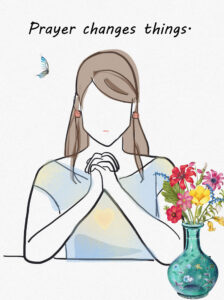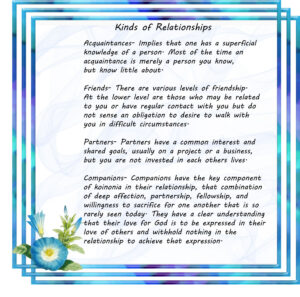Everything changes when you are stripped of your life partner. Nearly every widow feels desperately alone in spite of the fact losing a spouse is almost a universal experience. There is no way to prepare for the devastating impact this loss brings. Healthy transformation requires a firm foundation in your relationship with the Lord and happens more smoothly with liaisons in your family and friends who are willing and able to give the quality support you need.
 Bereavement poses important quandaries that may have lifelong impact. Many widows face these powerful and perplexing questions while still reeling from the emotional trauma of this extreme loss. The havoc that ensues after our husband’s death is further complicated when the relationships we need to give us a sense of stability and support in the wake of this upheaval are also battered and change.
Bereavement poses important quandaries that may have lifelong impact. Many widows face these powerful and perplexing questions while still reeling from the emotional trauma of this extreme loss. The havoc that ensues after our husband’s death is further complicated when the relationships we need to give us a sense of stability and support in the wake of this upheaval are also battered and change.
Recently I read a very good explanation of the different kinds of relationships we might have. Understanding there are multiple levels and types of bonds and interactions we share with the people we encounter and unite with can help us manage our expectations. We can save ourselves from undue frustration and disappointment if we identify the type of relationship we have with any given individual and treat it accordingly.
The book, Anointed to Be God’s Servants, by Henry & Tom Blackaby, goes into four different kinds of relationships.
Every person and each relationship is unique. There can’t be a one size fits all blueprint that addresses every connection we have, but we can create groups to distinguish important elements to help us differentiate various levels of intimacy. Separating the relationships we have into the categories outlined here can help us manage our expectations and temper our reactions even when our emotions try to escalate them.
Acquaintances is an easily understood category. These are people we barely know, and we wouldn’t have much expectation of them to be someone we can count on to help us through something as intense and personal as the loss of our husband. They may offer condolences but that is likely as far as our interaction might go.
Friends is a very general term. It seems to be more of an umbrella term for the rest of the relationships. The authors use it to describe the most trivial of friendships that involve people we know casually. They could be people we work with regularly, see at church or other places on a consistent basis, and even some of our own relatives we tend to more tolerate than embrace.
The next group is called partners. These are people we trust with shared goals in a work situation or a special project. The relationship caps in this context. It avoids going to a personal level. There is a wall of protection we erect to keep emotions and private individual life at bay.
These first three types of relationships probably make up the majority of the connections we have in our lives. Sometimes we may escalate the importance of these people and it leads to disappointment. When we are stressed, grieving, or going through difficult situations, we may assume certain people will step up for our sake, but it is not realistic to expect this. From their perspective, most of them will not be interested in getting involved because they do not value the relationship enough.
This unrealistic expectation is likely the basis of much of our distress over changed relationships after our loss. Not only are we in an extremely vulnerable state as a result of our loss, this contributes to us being unable to correctly reason out the depth of relationships. This is why so many widows suffer through the enormous secondary loss of heartbreaking changes in the relationships we feel are now battered and broken in the wake of our loss. Insane loneliness threatens to overwhelm us as we endure the pain of feeling misunderstood and abandoned.
True friends get their measure, over time, in their effect on you.
~Philip Yancy
Then we reach the group we need so fiercely as widows. These are called companions. Companions fall into a group of people we can earnestly count on no matter what. Unfortunately, finding and maintaining companions can be difficult. Widows who already have strong companions in their life before they lose their husband have a tremendous gift.
The Blackaby’s explain a key element of a companion is best described by the Greek word koinonia. This is because the book this is described in is all about getting Anointed to Be God’s Servants. The book examines the life of Paul from the Bible. Paul’s life teaches us to effectively support leaders around us. God created us to be in relationship. He seeks to be in relationship with us, and for us to be with each other. Supporting companions play a critical role in God’s kingdom. Godly companions reveal the wonderful nature of interdependence in God’s kingdom.
It’s not just church leaders who need the support of companions. Anytime we are going through a traumatic situation in life we all need someone or people we can count on to come alongside us to help us navigate the chaos. This is so critical for widows. No other life event compares to this.
Fellowship with other believers is a key aspect of the Christian life. The essence of koinonia is expressed when Christians come together in love, faith, and encouragement. Koinonia is found twenty times in the Bible to describe the early church devoting themselves to the apostles teaching, and coming together in communion, prayer, and companionship.
Companions are the best kind of relationship we can possibly find. This is the kind of friendship every widow needs. God desires us all to live in fellowship with likeminded believers and seek to be a companion to others in our circle of influence. I believe if we could all work to do this, we could change the lives of others going through tough situations and help bring healing and restoration much more quickly and efficiently.
Relationships can change as we proceed through the course of our lifetime. Coping with relationship changes when your husband moves to Heaven can be difficult. We become a different person after a significant loss. Part of us is changed forever. There is no getting back to the person we knew as our identity when our life included our husband.
 It is my prayer that each widow reading this has at least one companion you can count on to help you maneuver through the ups, downs, ins, and outs of being a widow. Prayerfully you have even more. We all need those special people we can count on to love us for who we are and be willing to support and encourage us through the days, weeks, months and years we may live this new and unexpected path we never wanted.
It is my prayer that each widow reading this has at least one companion you can count on to help you maneuver through the ups, downs, ins, and outs of being a widow. Prayerfully you have even more. We all need those special people we can count on to love us for who we are and be willing to support and encourage us through the days, weeks, months and years we may live this new and unexpected path we never wanted.
Most of us were blessed with our husband being our most cherished companion. Missing that relationship can be one of the worse parts of widowhood. It may well take more than one new companion to begin to fill that enormous hole in our life that hurts like crazy.
When we progress to a more stable place in our journey forward, it would be nice if as many of us as possible could look to be that much needed companion to a fellow widow who is struggling. Widows helping widows is a special gift only a widow can truly appreciate. None of us wish this title on another woman, but in this life we all know there is an ending to each life. There will always be new widows.
Our love for God shines when we express our love to others. What better way to show Him our appreciation for all He does for us than to willingly and generously shower love on a grieving widow. We can identify with her fear and pain. Let’s demonstrate to her what we know could help us and hold nothing back. Not only can we be the companion she needs in her darkest hour, we may eventually build a new friendship that gives us a new companion as well. God bless you.



This is beautifully said, thank you! It’s been very difficult since my husband was my companion. We had familiarity and support in our neighborhood in our home of 17 years. Sadly, the kids and me had to sell our home just last year, and this loss has been tough. It’s navigating the many layers of loss, while being ever aware of our primary loss, husband, Dad, the Godly leader of our family.
We were so very blessed if we had our favorite companion as our loving husband. There really is no one who can fill that terrible void left in the wake of his homegoing. It’s been a heartbreaking walk for you and I am sorry. The many layers of loss often go unnoticed and unappreciated by those who haven’t experienced it.
God is right here with us as we move forward. I certainly could not keep going without Him. He loves us and He carries us through the losses, keeping us wrapped in His loving and capable arms. With each win we make as we fight our way forward, we grow ever more confident in our trust He has our back. Our faith fuels the confidence we need to face each next challenge. May you find more times when you can rest in this faith and face your future with renewed strength. May your children see this and choose to keep their relationship with God as their unwavering center. God bless you.
Thank you Teri. I too appreciated this and found it very helpful.
I’m glad you found this helpful. We need all the encouragement and inspiration we can get to navigate this difficult journey. God bless you.
Very well written. Thank you, God bless you
Thank you kindly Lisa. God bless you! May you have all the companions you need in this life and become the companion someone else needs as well. Have a blessed and beautiful day.